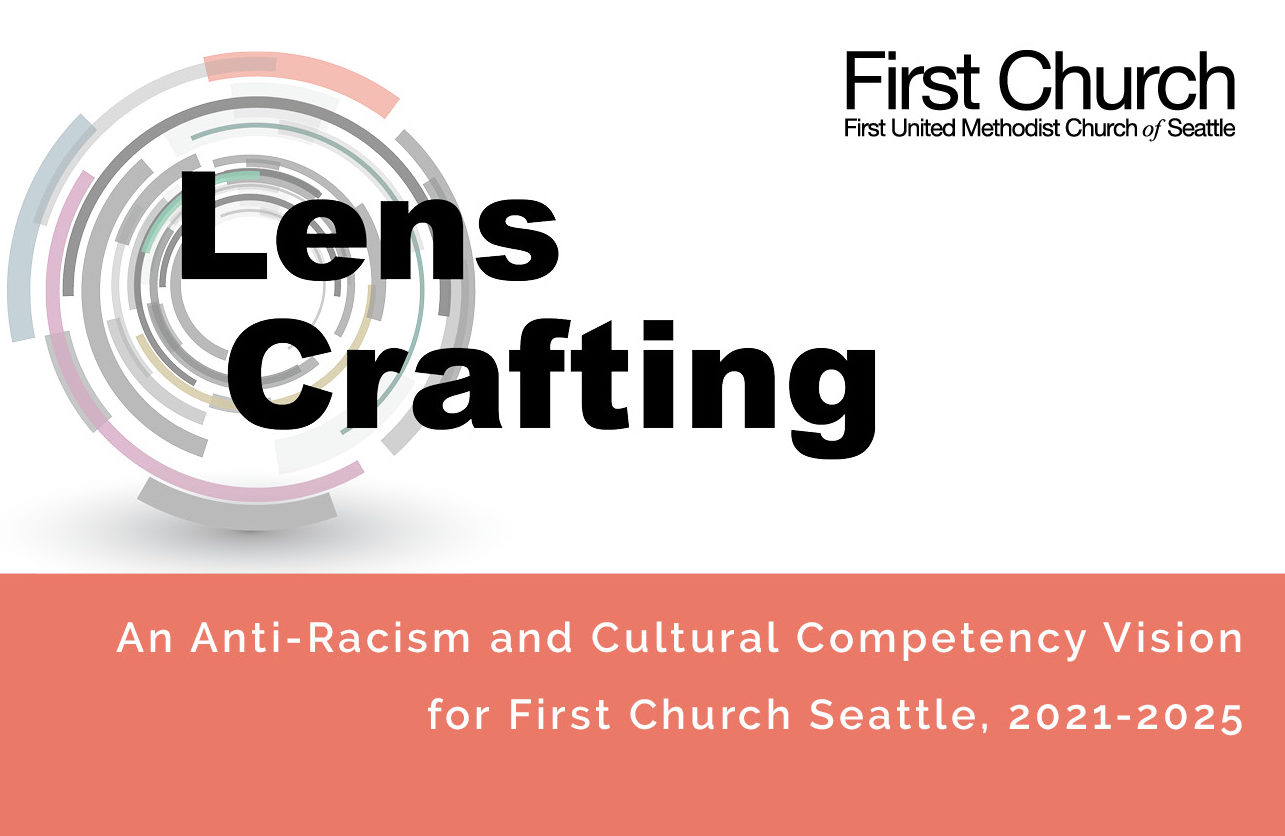
Why are we here?
- Upon reflecting on the 2018-2021 Vision & Mission of First Church, the Lay Leaders and pastors recognized our need to engage in anti-racism work in order to better craft our new Vision & Mission through an anti-racist lens.
- In February 2021, the Church Council Visioning Retreat affirmed this direction. The pastors and the Lay Leaders crafted this proposal alongside a few other voices from the Visioning Retreat for consideration by the Church Council at their April 2021 meeting.
Our commitment to becoming an anti-racist and interculturally competent congregation is grounded in the four Wesleyan sources of authority regarding faith:
Scripture: Woe to those who make unjust laws, to those who issue oppressive decrees, to deprive the poor of their rights, and withhold justice from the oppressed—of my people. Isaiah 10:1-2a (NIV)
Reason: While black Americans make up 13% of the US population, they hold only 2.6% of our national wealth, are overrepresented in the prison system, and underrepresented in homeownership and employment, even when holding similar levels of education to their white counterparts. Racial wealth and opportunity disparities also exist for Latinx people, Native Americans, and Pacific Islanders. Existing social systems perpetuate these disparities.
Tradition: The 2016 United Methodist Book of Discipline names “racism as sin and is antithetical to the gospel itself” both inside and outside the church.
Experience: In our life together as a church made up of individuals from many different racial and cultural backgrounds, as well as diverse sexual orientations and gender identities, we recognize the human cost of discrimination and bigotry. We seek to be a congregation where each person is valued, their unique voice is heard, and Christ’s all-encompassing love is extended to all.
What is our Hope?
Vision for First Church: The First Church Seattle congregation will equip itself to continue working toward intercultural competency, practicing anti-racism and confronting white supremacy, while participating in community organizing. Becoming more interculturally competent will help First Church better intersect with its own context, amplify and multiply partnerships, and create disciples who engage others in unexpected ways that help transform the world to better reflect God’s beloved community.
What will get us to our hope?
There are five processes that will help us get where we hope to be.
Developmental Approach: Participate in the foundational work of understanding how we develop more complex understandings of cultural differences and commonalities in order to build resilience and skills for engaging equity and justice issues well. The Developmental Model of Intercultural Sensitivity (DMIS) will give us common language and tasks that will be helpful as walk this path together.
Anti-Racism Model: Immerse ourselves in anti-racism education and experiences so we don’t trip over ourselves, allowing for deeper analysis of our own theology and expressions.
Community Organizing Model: Train our leaders in an asset-based community development and community organizing model to take what we learn out into the world in a decolonized fashion.
Participatory and Solidarity Model: Connect our congregation with rapid response networks to send people to support local activism efforts and distribute local messages back to the First Church community.
Visioning Model: Envision a better way forward after the above processes have started, providing a stronger lens for congregational visioning and leadership emphases.
How and when to get to our hope?
Summer 2021 – Phase One – Leadership Development
Developmental Approach: Participate in applying the DMIS model to our lives and ministry, led by Kristina Gonzalez, Director of Innovation for an Inclusive Church for the Greater Northwest Area of our UMC. This will include:
- Four 15-20 minute virtual learning videos (2 in June and 2 in August) for church leaders to engage on their own time (with optional scheduled conversations) of the various stages of intercultural development embodied in DMIS.
- Zoom Leadership Training: 1 live exploration on Zoom of intercultural development on Saturday, June 26th 8:30am – 10:30am. Expected attendance by outgoing and incoming church leadership. Potential follow-up in August.
- 1 virtual learning video provided on the complex cultural dimensions that are at play when we attempt to operate in the world. This is offered to each team at First Church to use as they constitute their new leadership teams.
- Optional session of the Intercultural Development inventory (IDI). (August)
Participatory and Solidarity Model: Develop a Rapid Response team to support anti-racism efforts against the structures of society.
- Team that works on connections, communications, and channels to get First Church bodies and messages where they need to be. (June)
Fall/Winter 2021 – Phase Two – Congregational Development
Anti-Racism Model: Partner with anti-racism education efforts
- Hold two or more training events on anti-racism led by non-profits specializing in anti-racism education. (October/November)
Community Organizing Model: Identify 5 leaders and one pastor to participate in Organizing For Mission (OFM) Network training
- 1 introductory session on community organizing (ABCD) (September)
- Identification of folks to sign up for OFM training. (September)
- Optional involvement in the Church and Community Development for All People training (when scheduled)
Winter/Spring 2022 – Phase Three – Visioning
Visioning Model: Church Council leads 2022 – 2025 Visioning Process
- Congregational Visioning Process (February – March 2022)
- OFM trainees lead efforts within the congregation (Ongoing)
Summer 2022 – Phase Four – Embodying
The Visioning process empowers First Church to integrate what it has learned into the church structure. Leaders are empowered to continue the emphasis in all areas of leadership.
What other opportunities are there?
- Lunch and Learn speakers and Book/Bible studies to amplify the Models’ impact.
- Small Group accountability circles
- Area solidarity trainings geared towards churches
- Assistance with items from the Visioning Retreat that Church Council will prioritize and assign to relevant teams.
